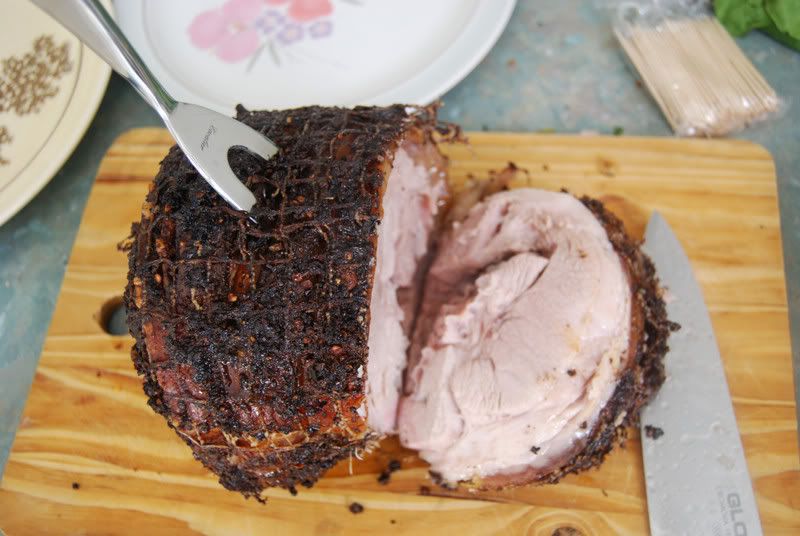
You know, I've never roasted pork before. Done chicken, done duck, done goat, but never pork. This was inspired as much by a jerk spice mix I stumbled upon as my girlfriend's love of jerk dishes. Jerk, by the way, is a Jamaican thing. It refers to a cooking technique that involves marinating and then slow-cooking. Seeing as this was an experiment on my part, the quantities and ingredients aren't set in stone. Feel free to experiment. Adjust the spices to suit your tastes. Cooking shouldn't feel like you're working in a laboratory.
That being said, there's one rule I always, always, always follow in my kitchen--all spices, from sea salt to allspice, are freshly ground. You can use a mortar and pestle, as I do, or one of those electric spice grinders. Whatever. But grinding the spices as you need them makes for superior flavour and aroma.
Ingredients:
1.5 kilogram (3.3-3.4 pound) boneless pork shoulder, rolled
2 dried chillies (optional)
4 teaspoons freshly ground allspice
2 teaspoons mild chilli powder
1 teaspoon freshly ground black pepper
1 teaspoon freshly ground dried thyme leaves
1/2 teaspoon freshly ground white pepper
pinch of sea salt
dark rum
Malibu (white rum with coconut--you can use regular white rum or even dark rum if you don't have this)
olive oil
In a small bowl or cup (me, I always use a tea cup) combine the allspice, chilli powder, black pepper, thyme leaves and white pepper. Gradually add the dark rum, stirring as you do. What you're aiming for is a thick paste. How much rum? Well, that depends. If you use chilli flakes instead of powder, it'd change. If your spices are ground really fine, it'd change. For me, one of those miniature bottles of Bundaberg dark rum was perfect. After I'd made the rum/spice blend I had just enough liquid left over to splash over the pork before placing it in the oven.
Now, take the pork. If the butcher hasn't already scored it, you'll have to do that yourself. Make shallow incisions--a lot of folks use a box cutter for this, but a sharp paring knife will do the job equally well--across the skin. Don't cut too deep. The goal isn't the hack into the flesh.
Once the incisions have been made, rub a little sea salt into them. Salt helps the skin go all crispy during the cooking. Next, take the rum/spice blend and rub that into the pork too, ensuring you work it into the incisions. Take the two dried chillies, if you're using them. At either end of the rolled pork shoulder, you should be able to feel a hole where the bone once was. Jam the chillies into these holes, working them in with your fingers.
Place the marinated pork into a bowl, cover and refrigerate for at least a couple of hours. The longer the better, really.
When you're about ready to cook, remove the pork from the refrigerator and pre-heat the oven to 220*C (about 430*F). Now, the pork. Shoulder is a fatty cut. Under all that skin, there's just a stupid amount of fat. And that's good, right. Fat is flavour. But what's not good is when fat leaks from the meat and ends up, well, stewing the meat. So what you need is a roasting pan with a rack that can hold the meat above any liquid that leaks out. If you don't have one of those, though, don't despair. Place the pork skin side up and use a couple of long, metal skewers will do the job--just spear the pork maybe a centimetres into the 'base', then balance the skewers on the side of the roasting pan. Like so:
________PORK_____________
| |
|______PAN_________|
Yeah, sorry for the bad ASCII art, but I didn't think to snap a photo of my dodgy skewer/rack contraption.
Pour a splash of dark rum and a little olive oil--no need for too much--over the pork. Roast at 220*C for 30 minutes. Then remove it from the oven. Deglaze the pan with a splash of Malibu, drop the oven temperature to 150*C (300*F, I believe) and return the pork to the oven another 3 1/2 hours. Remove from the oven every so often to baste with the flavoursome grease that collects at the base of the pan. Don't worry if, early on, the kitchen reeks of Malibu. The flavour and aroma will mellow during the cooking process.
When the pork is finished cooking, remove it from the oven. Let it sit for a good 15-20 minutes uncovered before carving.
Tips and ideas:
This dish, as noted earlier, was an experiment on my part. As such, you should experiment with it.
Consider ditching the pork shoulder and using slices of belly or rib instead. Grilled slowly over a coal fire or on a barbecue, they'd surely be lovely. You could use the same marinade with boar, even. That'd be more authentic than domesticated piggy. You could use chicken, too--either a whole bird or the legs.
As for the 'stuffing' of dried chilli, that could be replaced or added to with a spring or two of fresh thyme.
This dish keeps wonderfully. I had the leftovers cold the following day in a sandwich and they were quite delicious.



No comments:
Post a Comment